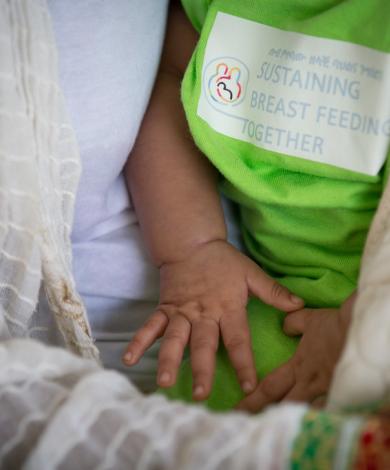At the beginning of August, ENN participated in a global webinar to mark World Breastfeeding Week organised by the Global Breastfeeding Collective (GBC), supported by UNICEF. During the webinar, we heard from experts on resources available to implement the Ten Steps to Successful Breastfeeding, learned from donors about why we need to invest in the Ten Steps, and were inspired by national and regional leaders’ experiences of applying the Ten Steps in their contexts. The ENN team then introduced the MAMI Care Pathway Package, as a useful resource to support implementation of Step 10 - Coordinate discharge so that parents and their infants have timely access to ongoing support and care – for small and nutritionally at-risk infants under 6 months and their mothers. We also had the pleasure of launching the Operational Guidance on Infant and Young Child Feeding in Emergencies 10-year Progress Report, produced by the IFE Core Group. To learn more about these initiatives, check out our recent blog where you can also watch the WBW webinar recordings, read a brief on breastfeeding as a safe, sustainable, climate-friendly resource on RTE Brainstorm and join the MAMI Global Network.
The presentations stimulated thought-provoking chat and discussion. Unsurprisingly, everyone in attendance was supportive of the importance of breastfeeding and the Baby Friendly Hospital Initiative (BFHI), but they wanted to know how they can do more and do better. Many identified the need for further training and resources to help improve the capacity of nurses and midwives worldwide. Some called for capacity-building and advocacy at the national level from WHO and UNICEF. Others shared experiences or requested specific advice on how to manage some of the more difficult situations, such as caesarean section or complicated births, or supporting migrant mothers.
Many raised the longstanding challenge of breastmilk substitutes (typically infant formula) being widely available, promoted, and often encouraged in hospital settings, contravening the International Code of Marketing of Breastmilk Substitutes. A potential game-changer around advertising was shared from Ireland with draft legislation including infant formula within online marketing regulations.
Questions were raised about who is responsible for enforcing the BFHI standards in hospitals. One of the most thought-provoking was: ”œOther health care practices are monitored and regulated as "standard." Maternity care should be as strongly regulated as, say, cardiac care or orthopaedic surgery. Why do we tolerate poor care for mothers and babies at a critical moment of their lives? We don't tolerate substandard care in other health disciplines.”
So why is breastfeeding seen as a nice to do not a need to do? We know that breastfeeding is a life-saving treatment for those vulnerable and at-risk, and it is an essential feeding mechanism for those not necessarily at immediate risk but for preventing future problems including obesity, diabetes, cardiovascular disease, allergies etc. All children and their mothers, in all corners of the world, need timely and appropriate support for breastfeeding and a constructive (rather than destructive) environment to do so. But we still haven’t figured out how to make this happen.
Attendees were very interested in how the MAMI and IFE resources might be applied in real-life settings. Can the resources be used in any setting or just in emergency settings? (Yes). How can practitioners learn more about how to apply and use these resources? (Join the MAMI Global Network). Click here for detailed answers to all the questions raised in the webinar.
The theme this year was to ”œstep up for breastfeeding”. We focused in on doing so for those infants and mothers who have the most to lose if we don’t and so much to gain if we do. Millions of infants under 6 months around the world are small and nutritionally at-risk, and the scale of effort needed risks paralysing efforts as we struggle on where to start. The most important thing is to start somewhere, and to focus on the baby steps we can take as individuals and together to get us there. It is important to keep an eye on our destination - that every small and nutritionally at-risk infant under 6 months and their mother is supported to survive, thrive and develop to their full potential. To get there, think and act on what you can do in your day-to-day work to contribute to our collective journey to get us there. If enough of us walk in step, taking many different scenic routes and helping each other along the way, we will get there.
The passion, interest and desire to act was palpable during the webinar. We want to tap in on this – we have done the talking, now let’s do the walking. We at ENN are committed to facilitating, brokering, encouraging and networking you all to make this happen. Let us all work together, as a global community, to help ensure babies and their mothers facing the most difficult circumstances get the support they need for successful breastfeeding, to survive, thrive, and grow to their full potential.

